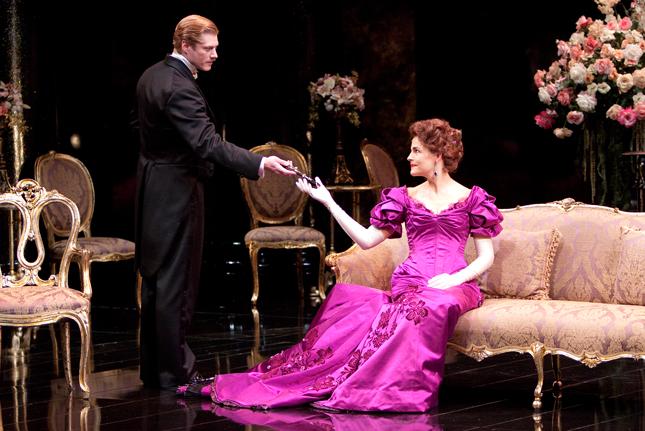“An Ideal Husband” makes good on the work; flaws may be in Wilde himself
By • July 26, 2011 0 1956

The Shakespeare Theatre Company’s production of Oscar Wilde’s “An Ideal Husband” has a lot going for it. It is stylishly staged, practically overpowering you with its visual gorgeousness both in sets and apparel. It’s also wonderfully acted by a cast of fresh young actors among the principal performers, buoyed by the presence of a trio of locals who perform fuss-budgets, grouchy fathers and man-servants better than just about anybody.
But in the end, ‘An Ideal Husband” is not…well, ideal. It’s missing something. It’s like a big vat of champagne that’s gone flat. Maybe the fault is not in the stars, but in Wilde himself. “An Ideal Husband”—which hit the public eye on the heels of the “The Importance of Being Earnest,” and just around the time when Wilde was about to take a scandalous and disastrous tumble—is full of Wildean social comedy that doesn’t pop nearly enough and too much high-minded tussles with moral issues and continuous retracing of exposition and plot.
But here’s what this production does do, in addition to dazzling the eye. In Washington, where scandal and matters of morality and probity are much talked about but not so much observed in practice, the main plot line and the main character are familiar as the last firing of a chief of staff, the last bit of cash flushed town a toilet, the last thunderous call to end ear-marks.
But it isn’t funny enough. Wilde usually dealt with hypocrisy, Victorian society’s self-infatuation and obsessions with titles, money and lineage. He played on his culture’s gigantic addiction to living life on the surface around Hyde Park with knowing, devastating, slashing metaphors and ready-to-go aphorisms. It still rains epigrams in “An Ideal Husband,” but they’re more like snowflakes than stinging rain.
Sir Robert Children is the play’s ideal husband in question, a rising figure in the British Empire’s foreign office. He is handsome, wealthy, and with a beautiful wife of such moral probity as to make Caesar’s wife look like a strumpet. Together they are the perfect Victorian power couple, childless but with reputations unstained by as much as a whisper of scandal, a late bill, a flirtation or a hair out of place.
In their firmament, beautifully displayed in a grand staircase with a circular mirror, there is a social order where everyone knows their place, including husbands and wives, gossip is rife, and small talk is so small you need a magnifying class to muddle through it.
One fine evening dinner at the Children estate, as butlers announce arrivals, up comes one Mrs. Cheverley, and you know she’s trouble because she arches her eyebrows with cynical disdain and is wearing a fetching, eye catching purple dress while everyone else seems to be attending a black-and-white (and very gray) ball.
Mrs. Cheverley is here to derail Sir Robert’s unblemished reputation because she knows that his fortune is built on a bit of insider trading on information he was privy to as a foreign service official. Such news of course would devastate his wife, who thinks he is, well, an ideal husband, not to mention his career and future. Whatever will he do?
Well, he has help in the character of Lord Goring, the seemingly fitful, lazy, lay-about son of the Earl of Chaversham (David Sabin, wonderfully harrumphing his way through a series of disapproving fits). Goring, played with playful elan by Cameron Folmar, is a kind of Scarlet Pimpernel of the social set. He is frivolous as a feather on the outside, while kind, faithful, brave and loyal on the inside. He’s had some dealings with Mrs. Cheverley and means to prevent her plot from succeeding.
But the fizz isn’t quite there—with some exceptionally fussy acting by Nancy Robinette as Lady Markby, and Floyd King’s amazingly varied ways of saying “Yes, My Lord.” There’s a gloomy atmosphere here in Gregory Woodell’s portrayal of Children, mortified that his secret is out, wrestling with shame, gloom and doom. He gives you a clear picture of a tortured man caught up in something like that, revealing him to be what he thinks is a fake. In Washington, a play like this echoes loudly.
And then there’s Mrs. Cheverley; Emily Raymond plays her haughty, alluringly even, but not with a sense of purpose other than to be without mercy. Or is she? Women like her usually have a secret that they keep for some time, and the consternation they cause arises from confusion about sex and virtue, not so much the less interesting follow-the-money theme.
That sexy stuff is missing here, because it isn’t there to begin with. This is a comedy about morals and probity, stuffed evening gowns and overwrought virtues. Director Keith Baxter tweaks the material wonderfully, to include a murky ending of sorts, but you miss the rolls of knowing laughter ever after.

